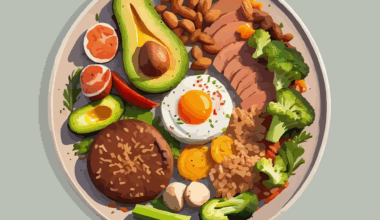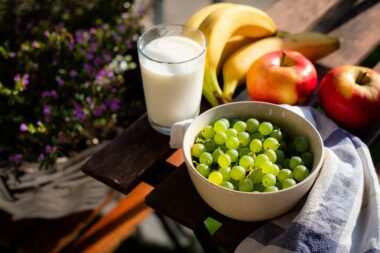Meal Timing and Choices for Busy People Before Exercise
Pre-workout nutrition is essential for enhancing performance and recovery, particularly for individuals leading busy lives. The timing of your meals can make a significant difference in achieving optimal energy levels for workouts. Focus on consuming meals that combine carbohydrates and protein, which will provide sustained energy and aid muscle recovery. Ideally, meals should be eaten 1 to 3 hours prior to exercise, allowing for proper digestion. Additionally, convenience is key—preparing meals ahead of time can alleviate the stress of last-minute planning. Incorporate easy-to-carry snacks, such as protein bars or fruit, for those on the go. Remember, meal prep doesn’t have to be time-consuming. Simple recipes that include whole grains, lean meats, and natural sources of fats can be prepared in bulk. Also, consider keeping nutritious foods stocked and accessible. Nuts, yogurt, or oatmeal are excellent options for quick energy boosters. Staying hydrated is another critical factor. Consume adequate fluids throughout the day, and especially in the hours leading up to your workout. Ultimately, understanding the importance of meal timing and planning can lead to improved workout experiences.
When it comes to meal choices before a workout, the evidence supports a balanced approach. Carbohydrates act as a primary energy source, and pairing them with protein can enhance workout performance. Focus on foods that release energy gradually so you don’t end up feeling sluggish. Elevated energy levels can be achieved through complex carbohydrates like sweet potatoes, brown rice, or whole grain bread. You could also opt for simple snack options like bananas or apples if you’re running short on time. In terms of portion size, listen to your body and adjust accordingly; larger meals can weigh you down if consumed too close to exercise. For those who work out very early in the morning, consider having a pre-workout snack that’s easy to digest. A smoothie with fruits and a scoop of protein powder could serve well in this case, or even a small bowl of oatmeal topped with nuts. Importantly, avoid high-fat, greasy foods and those rich in fiber immediately before exercising to ensure optimal digestion. Prioritizing nutritious choices plays a vital role in overall performance and health.
Combining Nutrients for Optimal Performance
It is vital to understand how different nutrients work together pre-workout. Combining carbohydrates with proteins can yield the best results for energy and muscle function. Carbohydrates provide the fuel needed for high-intensity exercises, while proteins contribute to muscle repair and growth post-exercise. Practical meal ideas include a Greek yogurt parfait with fruits and granola or a smoothie blending spinach, banana, and protein powder. These options supply essential nutrients without causing digestive distress. Moreover, post-workout meals should also not be overlooking. After your session, a snack rich in both carbohydrates and proteins helps replenish glycogen stores and promotes muscle repair. For busy lifestyles, consider meal prepping your snacks as a sustainable approach. Cook large batches of quinoa, chicken, or roast vegetables, then portion them for easy access before your workouts. Additionally, staying mindful of hydration throughout the day will ensure that you maximize your performance. Keeping a water bottle handy and sipping regularly can prevent dehydration, which can severely impact your workout efficiency. Proper nutrient combinations can lead to noticeable improvements in performance and overall recovery.
The timing of meals isn’t merely about eating before exercise; it also involves the post-workout recovery process. Following a workout, aim to consume a balanced meal within 30 minutes to 2 hours to optimize recovery and repair. This period is crucial because muscles are primed to absorb nutrients during the recovery process. For quick recovery, choose snacks or meals that are easy to digest, such as a protein shake or a turkey sandwich on whole grain bread. Moreover, experiment with liquid nutrition if solid food feels unappealing immediately after exercise; smoothies and shakes can be highly effective in meeting nutritional requirements in these cases. Don’t overlook the effects of micro-nutrients either; vitamins and minerals from fruits and vegetables play vital roles in muscle recovery and boost overall health. Focus on a colorful plate, as diverse nutrients support recovery on multiple levels. Especially in busy lifestyles, keeping snacks and meals simple yet effective becomes paramount. Make use of your weekly cheat meal by incorporating highly nutritious options from your favorite cuisines that keep you energized. Establishing a routine around meal timing is essential for busy individuals aiming for fitness.
Responsive Meal Planning Techniques
Implementing responsive meal planning techniques enables busy individuals to both adhere to their nutritional needs and fit exercise comfortably into their schedules. Key aspects of this planning involve scheduling meal prep days, where you can dedicate time to preparing multiple meals or snacks. This eliminates the stress of food choices during hectic schedules. Prepare meals during weekends, when you might have more time. Batch cooking is a great way to create nutritious bases, such as rice, grilled chicken, or roasted vegetables that can be used in various dishes throughout the week. It also allows you to have healthy options readily available when you need them. In addition, make use of online meal-planning tools or apps to help create a structured approach to your meal choices. These resources can assist in balancing your meals, ensuring proper nutrient intake, and helping you remain organized. Focus on variety in your meals to avoid monotony. Rotate lean proteins, complex carbs, and colorful vegetables for well-rounded nutrition. This strategic approach reduces the likelihood of impulse eating or reaching for unhealthy snacks.
Another crucial aspect of pre-workout nutrition is listening to your body and recognizing how it reacts to different foods. Individuals vary significantly in their digestion and dietary preferences, which means you need to customize your meals based on personal experiences. Maintain a food journal to track your energy levels and performance based on what you consume prior to workouts. This will help identify what works best for you. Pay attention to how different meal timings and combinations affect your performance; some may prefer a larger meal two hours before exercising, while others might feel better with a light snack closer to workout time. Experiment with meal types, frequencies, and sizes to see how your body responds, taking notes along the way. Moreover, consider consulting with a nutritionist to optimize your pre-workout nutrition plan. Professionals can offer tailored advice fitting your lifestyle and fitness goals. Meal timing strategies, therefore, become more personalized, maximizing both fitness gains and daily energy levels.
Incorporating Flexibility into Your Routine
Flexibility is an essential component in pre-workout meal planning, especially for those with busy schedules. Life can be unpredictable; hence, having predetermined meal options can provide versatility without sacrificing nutrition. Among the most effective strategies is creating a core set of quick and easy go-to meals that require little preparation. Make sure these meals are nutritious and packed with energy to fuel workouts. Keep staple ingredients on hand, such as canned beans, frozen vegetables, and quick-cooking grains, to whip up meals in a flash. A well-stocked pantry enables creativity, allowing you to mix and match ingredients based on your preferences. Additionally, when dining out or traveling, apply your knowledge of balanced meals to make healthier choices. Select meals that include a source of protein, a complex carbohydrate, and vegetables for optimal energy. This not only ensures nutritional adequacy but also provides a sense of control over your dietary intake. Avoid overly restrictive diets; instead, embrace moderation by indulging in occasional comforts that may provide psychological benefits, helping to maintain motivation toward your fitness goals.
Ultimately, understanding the role of pre-workout nutrition can profoundly impact performance, especially for those managing busy lifestyles. Practicing effective meal timing, choosing the right nutrients, and being responsive to your body’s needs are crucial. Prioritizing nutrition and preparation can lead to improved energy levels and workout outcomes, indispensable for maintaining physical health. Embrace the idea of making small changes in your meal planning—these modifications can lead to sustainable results without a complete overhaul of your routine. Seek inspiration from various sources, including cookbooks and websites, to discover new recipes and ideas to keep meals exciting. Moreover, maintaining hydration should remain a non-negotiable component of your routine. Efficient hydration can prevent fatigue and improve overall workout effectiveness. With consistent practice and a little creativity, busy individuals can easily integrate pre-workout nutrition into their lives, paving the way for enhanced performance and recovery. Remember that dedication to dietary choices is just as important as your commitment to physical activity. Finding your balance can unlock greater fitness potential, elevating both physical capability and overall wellbeing.





